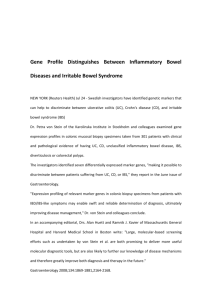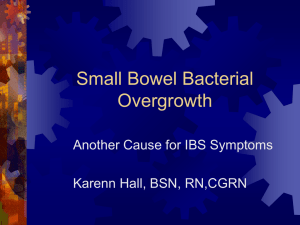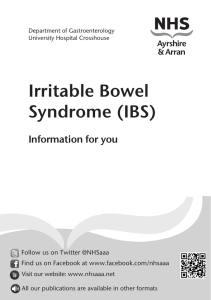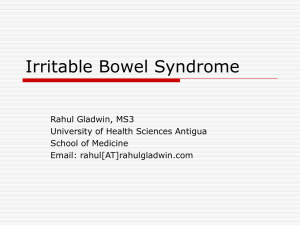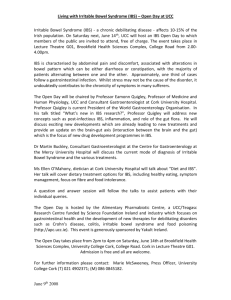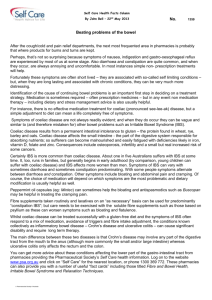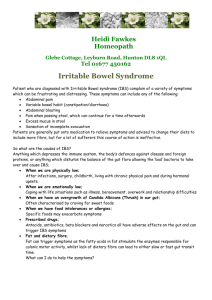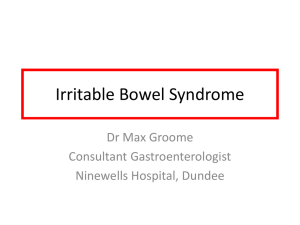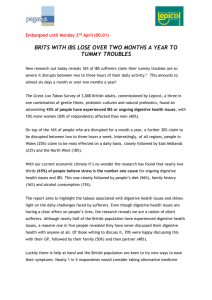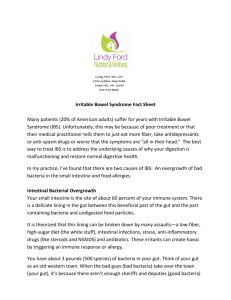Apr 2014 Irritable Bowel - University Family Medicine Center, PA
advertisement
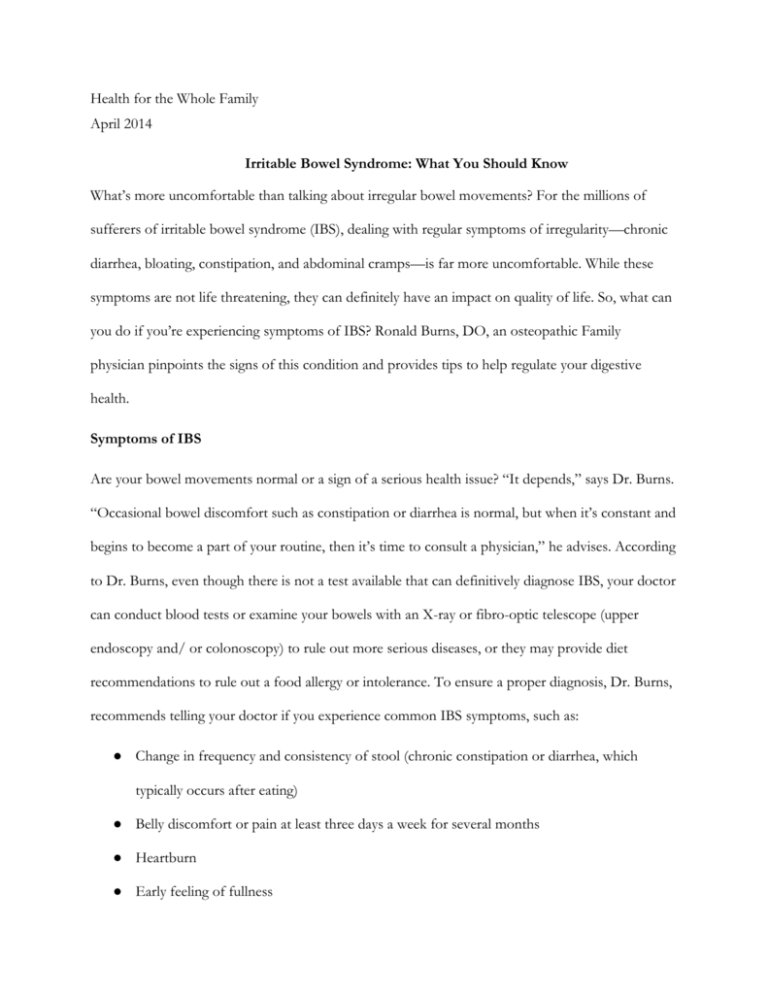
Health for the Whole Family April 2014 Irritable Bowel Syndrome: What You Should Know What’s more uncomfortable than talking about irregular bowel movements? For the millions of sufferers of irritable bowel syndrome (IBS), dealing with regular symptoms of irregularity—chronic diarrhea, bloating, constipation, and abdominal cramps—is far more uncomfortable. While these symptoms are not life threatening, they can definitely have an impact on quality of life. So, what can you do if you’re experiencing symptoms of IBS? Ronald Burns, DO, an osteopathic Family physician pinpoints the signs of this condition and provides tips to help regulate your digestive health. Symptoms of IBS Are your bowel movements normal or a sign of a serious health issue? “It depends,” says Dr. Burns. “Occasional bowel discomfort such as constipation or diarrhea is normal, but when it’s constant and begins to become a part of your routine, then it’s time to consult a physician,” he advises. According to Dr. Burns, even though there is not a test available that can definitively diagnose IBS, your doctor can conduct blood tests or examine your bowels with an X-ray or fibro-optic telescope (upper endoscopy and/ or colonoscopy) to rule out more serious diseases, or they may provide diet recommendations to rule out a food allergy or intolerance. To ensure a proper diagnosis, Dr. Burns, recommends telling your doctor if you experience common IBS symptoms, such as: ● Change in frequency and consistency of stool (chronic constipation or diarrhea, which typically occurs after eating) ● Belly discomfort or pain at least three days a week for several months ● Heartburn ● Early feeling of fullness ● Weight loss ● Nausea ● Bloating ● Passage of mucus in the stool ● Feeling of incomplete bowel emptying ● Fatigue ● Muscle pain ● Sleep disturbances ● Sexual dysfunction “Make sure to have an open and ongoing dialogue with your physician about your symptoms,” advises Dr. Burns. “Full disclosure of your symptoms is the first step towards a proper diagnosis and treatment plan. In addition, full work-up of symptoms is necessary to exclude treatable as well as cancerous processes that can masquerade as IBS.” Managing IBS Symptoms “The cause of IBS is unknown, but many people find their symptoms can be affected by their diet and also the amount of stress in their lives,” says Dr. Burns. He recommends chronicling your symptoms in a diary so that your doctor can see how your symptoms change over time and relate to diet, stress, and other factors. To help manage symptoms, he suggests: 1. Incorporating stress reduction techniques into your schedule and learning how to relax, especially when your bowel is in spasm and you feel the sudden urge to go. Getting adequate sleep is extremely important as well. 2. Avoiding caffeine, which can elevate the stress hormone cortisol, as well as cigarettes and alcohol is paramount. 3. Limiting FODMAPs, which are a group of carbohydrates that have been known to trigger IBS symptoms. Foods in this group include: a. Lactose, found in milk products b. Fructose, found in higher levels in apples, pears, honey, and agave syrup c. Fructans, found in wheat, onion, and garlic d. Galacto-oligosaccharides, found in beans, lentils, and soybeans e. Polyols, found in cherries, apricots, apples, and sugar-free gum and mints 4. Avoiding artificial sweeteners, candy and chewing gum (even sugarless), and soda pop, which can cause gassiness and cramping. In regards to the low FODMAPs diet, Dr. Burns recommends eliminating from your diet all foods that fall into this group for two to six weeks, then introducing one at a time to help identify which foods are triggering your symptoms. “Implementing some of these practices could go a long way in identifying trigger foods and managing your symptoms,” he says. Getting in Tune With Your Body “Don’t ignore irregularities in your body’s mechanics,” says Dr. Burns. “Get in tune with your body and pay close attention to any sudden or lingering changes,” he continues. “If you notice changes in your body’s functions, don’t delay in consulting your physician. With their assistance, you can develop a plan than can put your mind, and your bowels, at ease.” Preventive medicine is just one aspect of care osteopathic physicians provide. DOs are fully licensed to prescribe medicine and practice in all specialty areas, including surgery. DOs are trained to consider the health of the whole person and use their hands to help diagnose and treat their patients.
